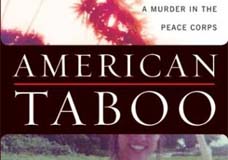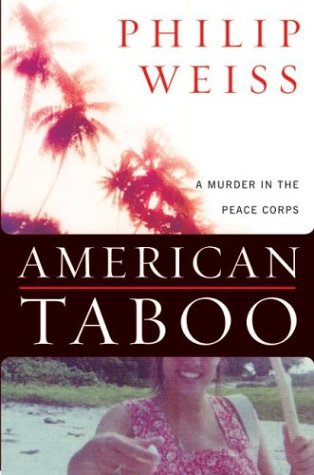June 27, 2004: Headlines: COS - Tonga: Crime: Murder: Safety and Security of Volunteers: San Fransisco Chronicle: A secret, sordid slaying in a noble organization
Peace Corps Online:
Directory:
Tonga:
Special Report: 'American Taboo: A Murder in the Peace Corps':
June 27, 2004: Headlines: COS - Tonga: Crime: Murder: Safety and Security of Volunteers: San Fransisco Chronicle: A secret, sordid slaying in a noble organization
American Taboo: A Murder in the Peace Corps
 | Charges possible in 1976 PCV slaying
Congressman Norm Dicks has asked the U.S. attorney in Seattle to consider pursuing charges against Dennis Priven, the man accused of killing Peace Corps Volunteer Deborah Gardner on the South Pacific island of Tonga 28 years ago. Background on this story here and here. |
 | American Taboo
Read the story of Volunteer Deborah Gardner's murder in Tonga in 1976 and how her killer has been free for the past 28 years with the help of the Peace Corps. Read an excerpt from Philip Weiss' book documenting the murder and coverup. Then read an essay by RPCV Bob Shaconis who says that Peace Corps' treatment as a "sacred cow" has exempted it from public scrutiny and that the agency has labored to preserve its shining reputation, sometimes at the expense of the very principles it is supposed to embody. |
A secret, sordid slaying in a noble organization

A secret, sordid slaying in a noble organization
A secret, sordid slaying in a noble organization
Reviewed by Eliza Wilmerding
Sunday, June 27, 2004
San Francisco Chronicle
Chronicle Sections
American Taboo
A Murder in the Peace Corps
By Philip Weiss
HARPERCOLLINS; 379 PAGES; $25.95
In his first nonfiction book, "American Taboo: A Murder in the Peace Corps," Philip Weiss reconstructs the 1975 murder of one Peace Corps volunteer serving in Tonga by another -- the only case in the corps' history where a volunteer killed anyone. The story will appeal to readers drawn to true (and palpably sensational) crime stories: Beautiful and free-spirited Deborah Gardner, a 23-year-old Peace Corps volunteer and science teacher, was watched and desired by many men, stalked by one, and then stabbed 22 times one October night in her Tongan hut. The killer -- according to Weiss, a 24-year-old from New York named Dennis Priven -- fled, leaving among other objects a dive knife, a bottle of cyanide and a steel pipe. After a botched suicide attempt, the accused volunteer turned himself in. Three and a half months later -- with the help of the U.S. government -- he walked free.
We're told so much before turning to the first page -- perhaps to steer our interest away from the bloody event itself and toward the why and how it all could have happened. (This proves unnecessary; our sense of lost justice eventually sends us questioning anyway.) The story moves far beyond murder; it becomes a careful accounting of a valued government agency hiding information in order to protect itself. Readers will be gripped and frustrated to learn how a series of Peace Corps policies (and lack thereof), perversely protective decisions on the part of certain corps officials, and skillful trial maneuvers worked to set Gardner's killer free. With information gathered from corps volunteers and officials who served in Tonga at the time, family, friends and acquaintances of both Gardner and her killer, Tongan newspaper articles and materials obtained through the Freedom of Information Act, Weiss strings together the events and perspectives leading to the gruesome night, the murder, the investigation and trial.
He details how one corps official ignores the killer's obsessive behavior and Gardner's corresponding pleas to be transferred to another site. He reveals how the corps continuously de-emphasized the event when describing it to government officials, the press and Gardner's family -- if mentioning it at all.
Weiss isn't the only one to peel this sordid tale open. Coincidently, Gardner's story and its cover-up follow a large-scale investigation of Peace Corps volunteer deaths and assaults by the Dayton Daily News. (Since the corps' inception in 1961, the newspaper found that out of 170,000 volunteers, 2,900 have been assaulted and 250 killed. Twenty of those were murdered, nearly the same number committed suicide, 28 died from drowning and 100 died in car accidents.)
During its first 28 years, the Daily News reported, the corps neglected to gather crime data for self-evaluation and omitted a number of deaths and assaults from published crime statistics. Reporters also found that the agency inaccurately described events, made only reticent efforts to publicize them, kept information from families and ignored concerns of volunteer security -- even from officials within the corps. Weiss quotes a memo written by the Action director to his successor stating that though Peace Corps officials are good, moral people who are spiritually motivated, "one of the consequences of this sense of spiritualism is the elevation of the priority 'Peace Corps must survive' above all other considerations."
"This meant that Peace Corps would always put a higher priority on the life of the program in a country than it did on the health, safety and welfare of volunteers,"
Avid readers of narrative nonfiction will find Weiss' reporting dazzling, but may question one or two of his writerly decisions. Unlike his past work (for the New York Times Magazine, Esquire and Harper's magazine, and his novel, "Cock-a-Doodle-Doo"), sometimes this writing seems rushed. Periodically, Weiss misses a charmingly casual tone and settles for careless sentences. Characters' thoughts and desires beg for attribution despite our trust in Weiss' reporting. He's sprinkled a jumble of proper names of less significant characters through the text.
Finally, he's written himself into the story and involved us in his journalistic process. While the move could be justified, this reader was nonplussed. (At one point, Weiss confronts Gardner's killer these many years later after finding out that Priven is living in Brooklyn.) But these are minor bumps along the way.
Above all, readers will find "American Taboo" an important and absorbing story. On the whole, this is a book thick with energy and polished with good journalism and a writer's touch.
Eliza Wilmerding is a San Francisco writer. Her work has appeared in the Los Angeles Times and Mother Jones.com, among other newspapers and magazines.

Some postings on Peace Corps Online are provided to the individual members of this group without permission of the copyright owner for the non-profit purposes of criticism, comment, education, scholarship, and research under the "Fair Use" provisions of U.S. Government copyright laws and they may not be distributed further without permission of the copyright owner. Peace Corps Online does not vouch for the accuracy of the content of the postings, which is the sole responsibility of the copyright holder.
Story Source: San Fransisco Chronicle
This story has been posted in the following forums: : Headlines; COS - Tonga; Crime; Murder; Safety and Security of Volunteers
PCOL12069
33
.
|
By Don Anderson (owensound-ppp147717.sympatico.ca - 216.209.249.40) on Wednesday, August 25, 2004 - 9:34 pm: Edit Post |
A brief comment from a Canadian who spent many years in International Development. If this story, interesting as it is, re-activates and re-energizes the concept of the US Peace Corps, then hallelujah say I. If John Kerry is elected in November, he could do America greater good investing in Peace Corps activities than in pursuing the war in Iraq.



